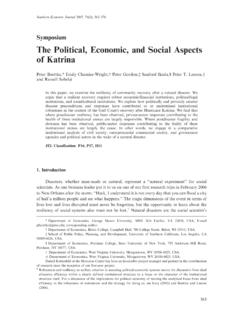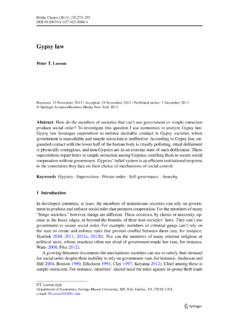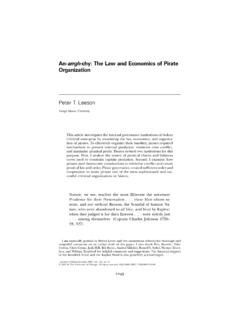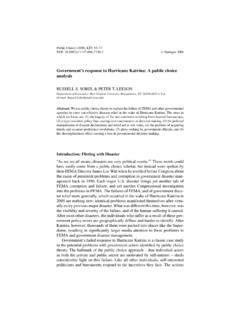Transcription of Ordeals - Peter Leeson
1 691[Journal of Law and Economics,vol. 55 (August 2012)] 2012 by The University of Chicago. All rights reserved. 0022-2186/2012/5503-0024$ T. LeesonGeorge Mason UniversityAbstractI argue that medieval judicial Ordeals accurately assigned accused criminals guilt and innocence. They did this by leveraging a medieval superstition callediudicium Dei(judgments of God). According to that superstition, God con-demned the guilty and exonerated the innocent through clergy-conducted phys-ical tests. Medieval citizens belief iniudicium Deicreated a separating equilib-rium in which only innocent defendants were willing to undergo on observing a defendant s willingness to do so, the administeringpriest knew he or she was innocent and manipulated the ordeal to find theory explains the peculiar puzzle of Ordeals : trials of fire and water thatshould have condemned most persons who underwent them did the exonerated these persons instead.
2 Boiling water rarely boiled persons whoplunged their arms in it. Burning iron rarely burned persons who carried outcomes were miraculous, but they were miracles of mechanism is a fearful thing to fall into the hands of the living God. [ :31]1. IntroductionFor 400 years the most sophisticated persons in Europe decided difficult criminalcases by asking the defendant to thrust his arm into a cauldron of boiling waterand fish out a ring. If his arm was unharmed, he was exonerated. If not, he wasconvicted. Alternatively, a priest dunked the defendant in a pool. Sinking provedhis innocence. Floating proved his guilt. People called these trials thank Gary Becker, Omri Ben-Shahar, Peter Boettke, Richard Brooks, Dennis Carlton, ChristopherCoyne, Frank Easterbrook, David Friedman, Todd Henderson, Emir Kamenica, Roger Koppl, WilliamLandes, Steven Levitt, Anup Malani, David Myatt, Emily Oster, Alexandre Padilla, Eric Posner, RichardPosner, Jesse Shapiro, Steven Shavell, Andrei Shleifer, and Virgil Storr; seminar participants at HarvardLaw School, Stanford Law School, and the University of Chicago; the editors; and an anonymousreviewer for helpful comments.
3 I also thank the Becker Center on Chicago Price Theory at theUniversity of Chicago, where I conducted this other Ordeals existed, but they were rarely used and generally unimportant. Where theywere more important, I discuss Journal of LAW&ECONOMICSNo one alive today believes Ordeals were a good way to decide defendants guilt. But maybe they should. This paper argues that Ordeals accurately assignedaccused criminals guilt and innocence. They did this by leveraging a medievalsuperstition callediudicium Dei(judgments of God). According to that super-stition, God condemned the guilty and exonerated the innocent through clergy-conducted physical citizens belief iniudicium Deicreated a separating defendants expected Ordeals to convict them.
4 Innocent defendants ex-pected the reverse. Thus, only innocent defendants were willing to undergoordeals. Conditional on observing a defendant s willingness to do so, the ad-ministering priest knew he or she was innocent and manipulated the ordeal tofind theory explains the peculiar puzzle of Ordeals : trials of fire and water thatshould have condemned most persons who underwent them did the exonerated these persons instead. Boiling water rarely boiled persons whoplunged their arms in it. Burning iron rarely burned persons who carried outcomes were miraculous, but they were miracles of mechanism is easy to dismiss Ordeals as the irrational custom of Dark Age scholarship that addresses Ordeals treats them as such (see, for instance,Robertson 1782; Gibson 1848; Plucknett 1956; Baldwin 1961; Caenegem 1988).
5 More recently, several authors have attempted to rescue Ordeals from Europeanlegal history s museum of the absurd. One account argues that Ordeals facilitatedcommunity consensus and unity (Colman 1974; Brown 1975; Hyams 1981).Another account suggests that Ordeals were criminal punishments (Lea 1973;Hyams 1981).3A third argues nearly the opposite: Ordeals were a tool of mercy,a way to get criminals off the hook (Kerr, Forsyth, and Plyley 1992).No one seriously entertains the idea that Ordeals actually did what they weresupposedly designed to do: determine whether defendants were guilty of the2 Unilateral judicial Ordeals were not the only medieval judicial procedures grounded in theiudiciumDeisuperstition.
6 Oath swearing and, to a much lesser extent, judicial battle were also connected tothis view is the most natural one for a rational choice scholar to hold. Efficient criminal pun-ishment imposes a high penalty on criminals with a low probability (Becker 1968). In the contextof Ordeals , that would mean one of two things. If the ordeal itself was supposed to be the punishment,it would mean using Ordeals infrequently and boiling or burning everyone to whom they wereapplied. But Ordeals were used in exactly the opposite way: they were used frequently and boiled orburned only a small percentage of those to whom they were applied.
7 If the boiling or burning wassupposed to be the punishment, it would mean boiling or burning only a small percentage of accusedpersons but not going through the costly process of pretending to boil or burn every accused person,which is what Ordeals did. Closely related, if boiling or burning was the desired punishment, ordealswere a highly inefficient way to administer it. Ordeals were multiday undertakings that involvedmasses, endless rituals, and so on. It is much cheaper to just boil or burn persons instead. A thirdreason Ordeals do not make sense as punishments is that they were applied indiscriminately (thatis, without regard to an accused person s guilt or innocence since this had not been determined yet).
8 The theory of efficient punishment says something like boil every tenth criminal. But ordealsboiled every tenth accused person, which is very different. Finally, while punishments have the sameexpected cost for guilty and innocent persons, Ordeals had different expected costs for them. Thefeatures of Ordeals are consistent with the idea of Ordeals as fact-finding procedures, not of which they were analysis uses rational choice theory toshow how Ordeals did just that. In doing so, I develop a law and economics ofsuperstition. The law and economics of superstition explores the role that ob-jectively false beliefs play in the legal systems of rational no work uses rational choice theory to investigate superstition s per-sistence or relationship to the law.
9 Fudenberg and Levine s (2006) model ofsuperstitious beliefs and Posner s (1980) study of the economics of legal systemsin primitive societies are two exceptions to this. Fudenberg and Levine considerhow certain superstitions can persist even when individuals are patient, rationallearners. They show how superstitions can influence rational actors equilibriumbehavior. In my theory of Ordeals , superstition also determines individuals de-cision making in equilibrium. Further, the superstition-supported equilibriumis self-confirming. This contributes to superstition s persistence, but superstitionpersists for another reason too: it is socially aspect of my analysis is most closely connected to that of Posner (1980).
10 Posner notes superstition s prominence in primitive societies. He suggests thatsome of these societies objectively false beliefs may actually promote their well-being. For instance, the belief that wealthy group members are witches helpssome primitive societies enforce a norm of group sharing that permits socialinsurance. My analysis, which finds that medieval judicial Ordeals accuratelyassigned accused criminals guilt and innocence, complements Posner s sugges-tion that some superstitions are socially relevant to my argument, Posner (1980, p. 47) points out that certainsocieties religious beliefs discourage criminals from concealing their crimes.








